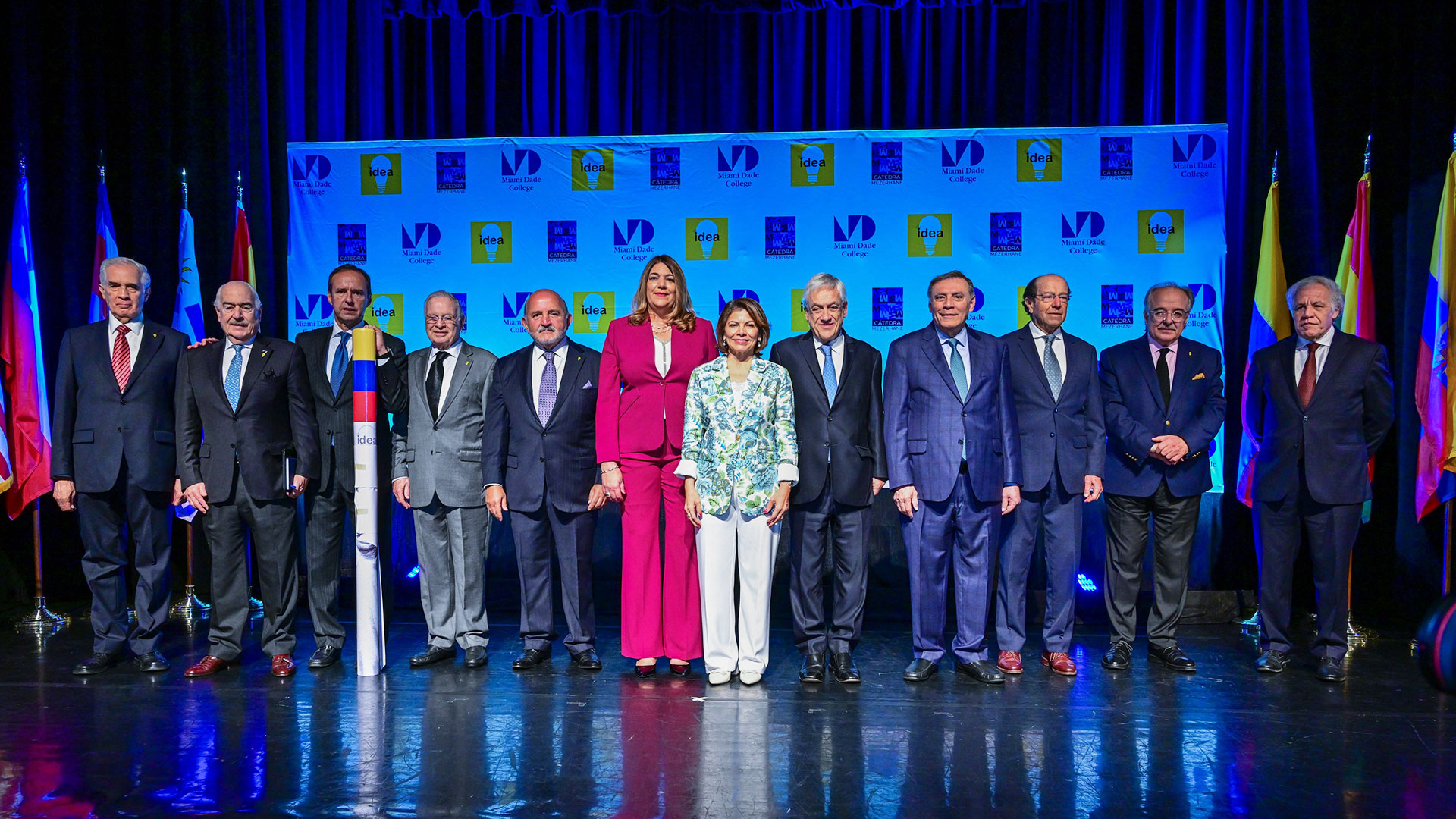Miami Dade College was once again a champion of global changemaking as it hosted the VIII Presidential Dialogue, an annual event that convenes former heads of state and thought leaders from across Latin America and Spain to discuss democracy and its pillars.
MDC President Madeline Pumariega welcomed the leaders as well as an engaged crowd of students, faculty and community members to the annual program, held at MDC’s Wolfson Campus in downtown Miami. The College hosts the event to encourage the exchange of ideas and enrich the learning experience of students beyond the classroom.
“It is important that our students have this opportunity to see what it means to be able to speak about democracy, understand freedom and, most importantly, have hope for the future,” said Pumariega. She emphasized the event coincided both with Election Day and the National Day for Victims of Communism, serving as a reminder to all to speak up for those who continue to fight for freedom.
Conducted in Spanish with simultaneous interpretation in English, the event presented two panel discussions under the theme “The Marginalization of the Rule of Law and the Criminalization of Politics in the Digital Age.”
The first panel, “The Political Intervention of Justice or the Politicization of Judicial Power,” moderated by NTN24 Director of Content Idania Chirinos, was led by remarks from Diego Valadés, president of the Ibero-American Institute of Constitutional Law. The panel included former presidents Laura Chinchilla (Costa Rica); Osvaldo Hurtado(Ecuador); Andrés Pastrana (Colombia); and Miguel Ángel Rodríguez (Costa Rica).
Chinchilla suggested the majority of Latin Americans believe that leaders are governing to benefit the elite. Diminishing that perception is essential, she said.
“If you really are interested in impacting the most vulnerable, the poorest people and the minorities, you can do it,” she said. “If we are able to invest more in them, I’m sure that we will have more support for democracy.”
The second panel, “Political Representation in the Age of Networks and the Legal and Judicial Oversight of Digital Governance,” moderated by RCN News Director Claudia Gurisatti, was opened with a presentation by Dr. Asdrúbal Aguiar, executive director of Iniciativa Democrática de España y las Americas (Grupo IDEA). Panelists included former presidents Iván Duque (Colombia); Luis Alberto Lacalle (Uruguay); Jamil Mahuad (Ecuador); Sebastián Piñera (Chile); and Jorge Tuto Quiroga (Bolivia).
Piñera said the instantaneous nature of social media can change public opinion more rapidly than ever before, and also reinforces a closed loop of information. Emerging technologies like Artificial Intelligence in particular, can reshape perceptions of the truth, furthering democracy’s vulnerability in the digital era.
“The algorithm makes it so that everything we say and receive in return, reinforces what we think and say,” he said.
Additional speakers included Luis Almagro, secretary general of the Organization of American States; José María Aznar, former prime minister of Spain and president of the Atlantic Study Institute; María Corina Machado, presidential candidate and former deputy of the National Assembly of Venezuela; and Dr. Nelson J. Mezerhane, editor of Diario las Américas. ABC News journalist and former Univision anchor María Elena Salinas served as master of ceremonies.
The Presidential Dialogue is a regional forum designed to discuss the geopolitical, economic and social challenges facing the Western Hemisphere. The College takes immense pride in hosting the event in partnership with the Mezerhane Endowed Chair at MDC, Grupo IDEA, Instituto Atlántico de Gobierno and Diario las Américas, all of which support our missions of being Democracy’s College and shaping the next generation of engaged global citizens.
“It is within dialogues like these, and through the power of education, that we can instill the values of truth, critical thinking and a strong foundation for our students,” Pumariega said.
